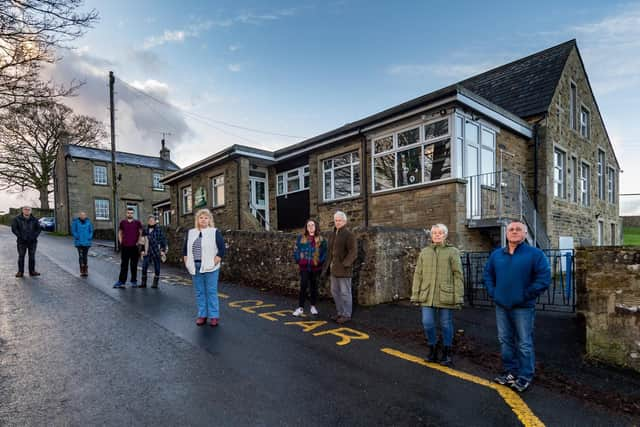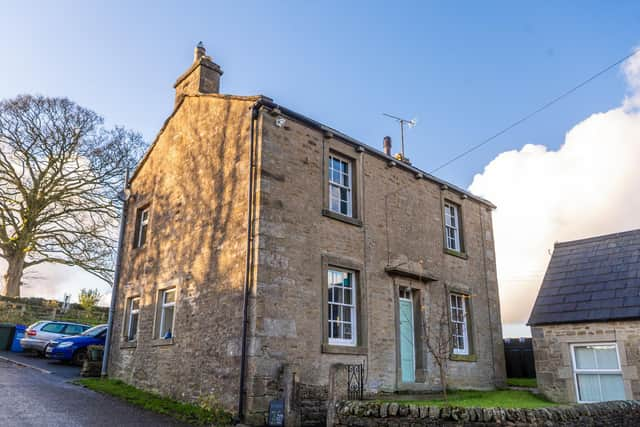Church v village row in Rathmell deepens as it's revealed that sale of old school would also include affordable house where a young family live
Trustees of the charity that runs Rathmell Old School are opposing the Church of England's bid to seize control of the building - which was gifted to the village near Settle by a wealthy benefactor in 1716 - and sell it for profit, despite never having owned it.
The Diocese of Leeds believes it has a claim to the school, which closed to pupils in 2017, because it was given Voluntary Aided status in 1953 and thereafter received financial support from the Church towards the children's education.
Advertisement
Hide AdAdvertisement
Hide AdYet since the closure three years ago, the building has been run by the trustees as a community hub and their legal ownership has not been challenged since the 18th century.


As well as the school, the land and original bequest - which is enshrined in deeds - included a schoolmaster's house and a field beside the River Ribble. After the Victorian custom of the schoolmaster living on-site died out, the property was rented out at affordable rates by the trustees, and the current tenants are a local family who cannot afford to buy a house in the area.
If the school and associated properties were to be sold by the Church, this family would have to leave, as would a farmer whose family have rented the field for grazing since 1972.
The Diocese's lawyers are attempting to lobby the government for a legal order which would change the ownership of the 'assets' currently run by the trust on the grounds that they were intended for the purposes of religious education, a role which they no longer carry out. The Church claims that any profit would be re-invested in other Voluntary Aided schools within the Diocese.
Advertisement
Hide AdAdvertisement
Hide AdYet the trust have countered this by asserting that when the school was founded in the early 1700s, it did not have any religious affiliation and operated on a secular basis for more than 200 years. The Church never owned the building or the land, which is held in trust for the village by the charity in perpetuity.


The trustees have accused the Church of behaving in an 'un-Christian' manner over the issue, as the annexation would deprive the community of 350 souls of their only social space. The building is now used for exercise classes, choir rehearsals, Young Farmers' Club meetings, a community kitchen, internet access, toddler groups, first aid courses and sewing classes. Rathmell has already lost its post office, pub, shop and garage in recent years.
Treasurer of trustees Jacky Frankland said: ""If the school is sold, it would leave Rathmell with nothing; the shop, pub and post office have already gone. We are using it for the benefit of the community, and it's one of the last things that brings this community together.
“Many other little villages have had their hearts ripped out by a Diocese. We have right on our side and will not surrender. Rathmell School is ours and always will be.”
Advertisement
Hide AdAdvertisement
Hide AdThe trustees are in possession of Land Registry and Charities Commission deeds relating to the history of the site, as well as written correspondence between the local vicar, a Reverend Savage, and the Church in 1954 in which he asked for clarification about the building's ownership once the school became Voluntary Aided and was told it would remain 'vested in the trustees'.
A further statement released by Mrs Frankland and Rathmell School Trust chair Rosemary Hyslop read: "They have no interest in caring for our small, rural community but clearly demonstrate un-Christian behaviour. On the Church of England's published list of objects, number four speaks of doing common good, 'through loving acts of neighbourliness and service to all; an object they absolutely fail to honour, especially in this year of the pandemic.
"Leeds Diocese is attempting to seize our charity’s assets for its own advantage, with no ethical regard for the social value to or the wishes of our community. Rathmell School Trust and all that it is belongs to Rathmell village."
A spokesman for the Diocese of Leeds said: “The Diocese must comply with charity law. To do anything else and to suggest that the diocese is seeking to act otherwise is improper.
Advertisement
Hide AdAdvertisement
Hide Ad"The Diocese is committed to positive conversations with the former trustees of any closed school site, including those at Rathmell.
"These are ongoing and all views are welcome, not only those of an interested minority. A closed school site is not “church property” as such as it is usually held upon specific trust related to education and application of these trusts once the school is closed raises a number of issues which have to be resolved. Such a trust cannot simply be ignored because it has become inconvenient to the local population who may wish to re-purpose the building from education to wider social use
"The Diocese of Leeds has not pursued the matter of a sale with the former trustees of Rathmell School since the closure of the school some years ago when an initial meeting explained the legal consequences of the closure of the school. The diocese is attempting conversations to secure a positive outcome for the whole village community.
"If the former school building were to be sold, the Diocese would not benefit financially, as any monies would be reinvested in children’s education within our many schools.”
Comment Guidelines
National World encourages reader discussion on our stories. User feedback, insights and back-and-forth exchanges add a rich layer of context to reporting. Please review our Community Guidelines before commenting.